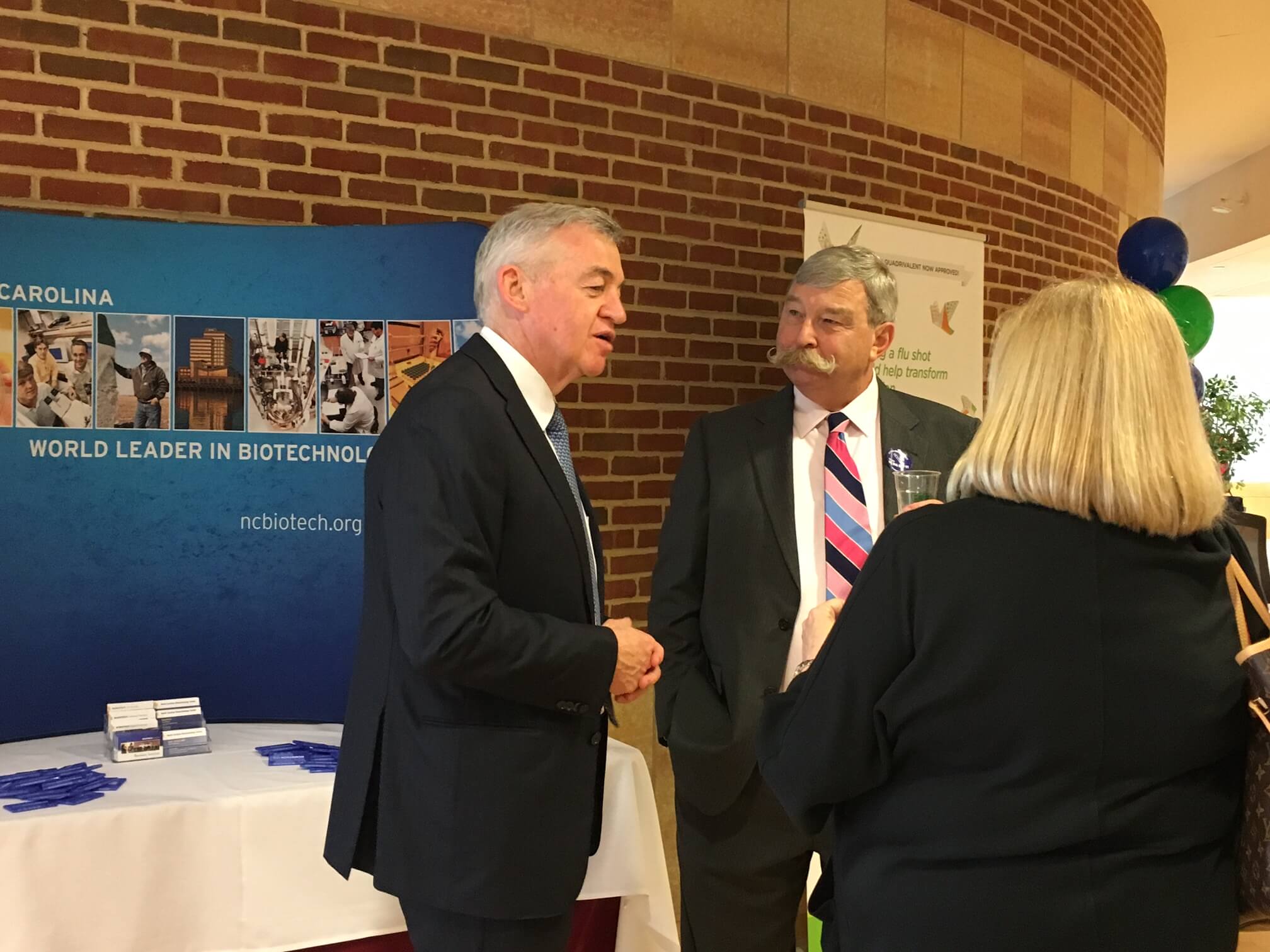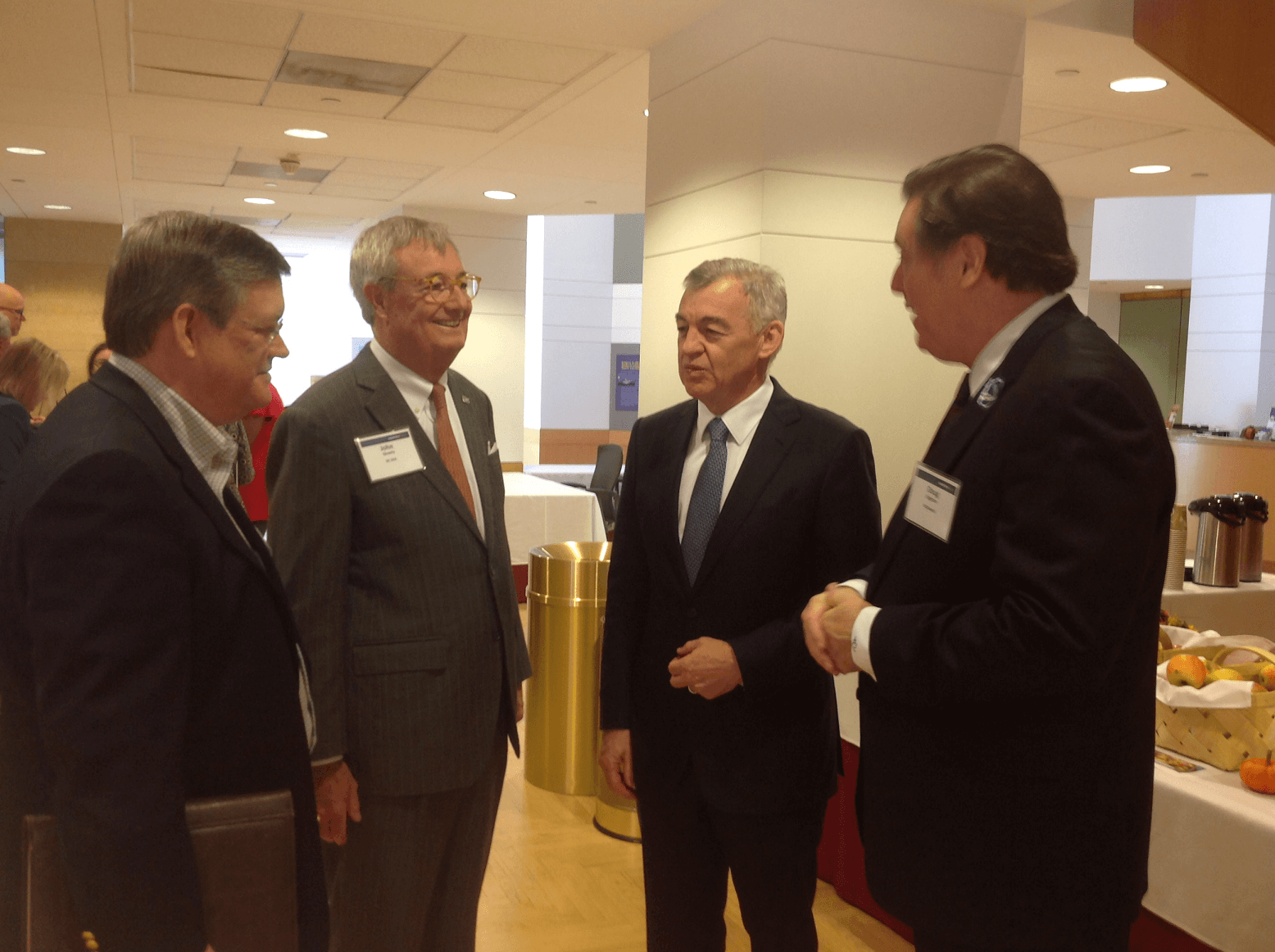
Flu Vaccinations Commemorate Epic Biotech Recruitment
Back in 2003, economic developer Bill Bullock of the North Carolina Biotechnology Center paid a visit to Chiron, a California-based vaccine maker. He wanted the company to be aware of a new workforce-training consortium in North Carolina that was preparing people for jobs in biopharmaceutical manufacturing.
 |
| NCBiotech's Bill Bullock (center) reminisces about Seqirus factory recruitment with Holly Springs Mayor Dick Sears and the town's head of economic development, Irena Krstanovic. |
A Chiron representative said casually, “We might be building something someday,” Bullock recalled.
That hint led to follow-up calls and visits by North Carolina recruiters until Chiron announced it would build a major flu vaccine production plant. Although the company was soon sold to Novartis, Novartis kept that commitment and in 2006 chose Holly Springs, N.C., over runner-up Athens, Ga., as the site for the vaccine plant.
“The initial hook was talent,” Bullock remembered. “We were doubling down on training new labor. Workforce training was crucial in the end.”
Novartis ultimately built, and later expanded, a $1 billion state-of-the-art vaccine plant in Holly Springs, a 30-minute drive south of the Research Triangle Park. The plant was sold in July 2015 to the vaccines division of CSL Ltd., a century-old Australian biologics company, and the new company was named Seqirus.
Today Seqirus is the world's second-largest vaccine maker, employing more than 850 people at the Holly Springs campus in seven buildings on 185 acres, producing a variety of vaccines.
On Tuesday, Bullock and some of the many other economic developers who teamed up on the Chiron/Novartis/Seqirus recruitment got a tangible reminder of the fruits of their labor. They rolled up their sleeves for a shot of flu vaccine made at the Holly Springs plant, 13 years after that initial visit to Chiron.
They were among more than 100 people who were vaccinated at the VaccinatioNCelebration, a public event organized by the Biotechnology Center to introduce the made-in-North Carolina vaccine, called Flucelvax Quadrivalent.
Among the vaccinated were John Skvarla, secretary of the N.C. Department of Commerce, which led the recruitment of the vaccine plant to Holly Springs.
Flucelvax Quadrivalent “is the largest breakthrough in vaccine technology since 1930,” Skvarla said. “Isn’t it wonderful that North Carolina is at the epicenter of that breakthrough? I think innovation is our middle name. It’s what we are and who we are.”
A Next-Generation Vaccine
Flucelvax Quadrivalent, approved by the Food and Drug Administration this year, protects against four strains of influenza that are projected to circulate in the United States this flu season: two influenza A viruses and two B viruses.
 |
| Dr. John Anderson (left), Seqirus' newly appointed head of the Holly Springs biomanufacturing site, gets acquainted with partners during the VaccinatioNCelebration at NCBiotech in Research Triangle Park. |
Unlike traditional vaccines that are produced in poultry eggs, Flucelvax Quadrivalent is made through a novel process called cell culture. The inactivated vaccine viruses that protect against flu infection are grown, or cultured, in mammalian cells inside sterile, stainless-steel bioreactors.
“It’s a closed system, a more protected environment,” explained Dr. John Anderson, site leader for the Seqirus plant. “Bioreactors can be scaled up quite quickly. They can produce more vaccine faster than you can with eggs. Eggs can be difficult to scale up because you have to have chickens to lay the eggs, and that takes time.”
Chickens are also at risk for contracting avian flu, which can contaminate vaccines. “That’s not a risk with the cell culture manufacturing process,” he said.
Faster scale-up of vaccine production could be critically important in the event of an influenza pandemic or a bioterror attack.
The Seqirus plant could produce up to 200 million doses of pandemic vaccine in six months, Anderson said.
The key to that capacity is having the trained workforce that Bullock emphasized 13 years ago when courting Chiron.
“Clearly this area is strong in that and provides a good microenvironment,” Anderson said. His plant benefits from skilled workers “from plant floor operators through leaders with experience in running facilities, engineers, quality analysts and scientists.”
A Boom to Holly Springs
Holly Springs, a town that had less than 1,000 residents in 1990, today has close to 35,000 inhabitants, and much of that growth is due to the Seqirus plant and the related economic development it has catalyzed.
“We’re very proud of what’s transpired,” said Holly Springs Mayor Dick Sears. “It’s been a good relationship.”
The plant has brought high-paying jobs that have helped raise the town’s annual median household income to $92,000, almost double the national average of about $52,000, Sears said.
 |
| John Skvarla, secretary of the N.C. Department of Commerce, is among the first recipients of Seqirus' new Flucelvax Quadrivalent flu vaccine during the public vaccination clinic and celebration at NCBiotech. |
He recalled hearing a third grader ask at a meeting, “How do I get a job there?”
Since the Novartis announcement in 2006, improvements to roads and infrastructure in the business park where the vaccine plant is located have attracted more businesses.
Fourteen buildings in the park now house 35 to 40 companies, including the latest addition, RoviSys, a process automation services company, said Irena Krstanovic, an economic developer with the Town of Holly Springs.
“They have chosen Holly Springs across from Seqirus because they have a contract with Seqirus,” she said. “We are seeing the impact of Seqirus’ presence in Holly Springs even 10 years later. The reason RoviSys is in Holly Springs is because of them.”
The company additions have also helped diversify the town’s tax base, which used to be 90 percent residential and only 10 percent commercial. “Novartis/Seqirus helped change that ratio,” Krstanovic said.
Economic Development ‘A Team Sport’
Holly Springs had a “big, early advantage” in recruiting Novartis/Seqirus to North Carolina, Sears said, because, unlike many small towns, it had its own in-house economic development team and staff attorney.
“Holly Springs did a phenomenal job on the infrastructure,” Bullock said. “The town invested in what it would take to win a project like this. They showed the value of a committed community.”
The town’s agents educated themselves about biotechnology, built relationships and briefed the town council and mayor, he said.
 |
| Vaccination conversation at the VaccinatioNCelebration is shared by (from left) Sam Taylor president of NCBio; John Skvarla, secretary of the NC Department of Commerce; Dr. John Anderson, site head of Seqirus' Holly Springs facility; and Doug Edgeton, president and CEO of NCBiotech. |
“The town was knowledgeable and ready,” he said. “Holly Springs has been the envy of a lot of people in the state for having prepared themselves for that opportunity.”
The town, the state Commerce Department and the Biotechnology Center were only a few of the many agencies involved in the recruitment, Bullock said. Other partners included NCBioImpact, NCBIO, BioNetwork, BTEC, the state Community College System, BRITE, Wake County Economic Development, and utilities, and design and construction companies.
“This project is very representative of how economic development is done well,” Bullock said. “When economic development is done well it’s a team sport. This one embodies that.
“When site location firms see that, they know they can get a deal done. They want the path of least resistance for their clients.”
At the vaccination event, Bullock found himself inevitably talking with other economic developers about the next Novartis/Seqirus recruitment.
“How do we do the next one?” he said. “How do we have an event like this for a company that makes a product in 10 years so the cycle continues?”
Skvarla, the Commerce secretary, said, “Our recruiting pipeline is full with hundreds of companies. It’s robust. We in North Carolina should be very proud of that.
“It says volumes about North Carolina – our workforce, our lifestyle. We really are on everybody’s list to be one of the best places to live and do business in the United States.”
